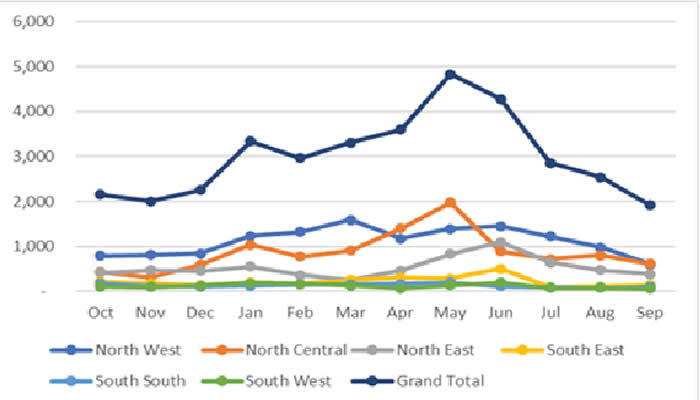
Steven Kefas’ comprehensive analysis paints a grim but data-backed picture of Nigeria’s escalating security crisis, particularly in the Middle Belt and Northern regions, with serious national implications:
Key Takeaways from the Report:
1. Targeted Attacks on Farming Communities
- Timing of attacks during planting seasons suggests a deliberate strategy to disrupt agriculture.
- Plateau, Kaduna, Benue, and parts of Niger and Kwara are under sustained siege.
- The aim appears to be to destabilize Nigeria’s food supply chain and economy through calculated violence.
2. Evolving Tactics of Terror Groups
- Shift from mass killings to targeted kidnappings, especially in areas like Kaduna (Kajuru, Chikun, Kauru, Kaura LGAs).
- These are lower-risk, high-reward operations, allowing terror groups to stay financially and operationally active.
3. Strategic Encirclement of the Agricultural Belt
- Multiple armed groups (e.g., Lakurawa, Mahmuda faction, Ansaru, Fulani Ethnic Militia) are now active across North Central states.
- The goal appears to be to control Nigeria’s breadbasket and cause long-term economic destabilization.
4. North-East: Boko Haram & ISWAP Resilience
- Despite official claims of military victories, attacks on military bases indicate tactical resurgence and coordination.
- These groups remain a viable threat and are not “defeated.”
5. Balloon Effect in the North-West
- Military crackdowns in Zamfara, Katsina, and Sokoto have displaced bandits, who now regroup in less-secured regions.
- This shows tactical gaps in Nigeria’s counterinsurgency approach.
National and Regional Implications:
- Food Insecurity: Threats to agriculture could lead to widespread hunger, inflation, and famine.
- Mass Displacement: Violence may trigger a new wave of internally displaced persons (IDPs), worsening humanitarian conditions.
- Economic Fallout: Disrupted food systems threaten local economies, increase youth unemployment, and fuel further unrest.
- West African Stability: Nigeria’s destabilization would have a spillover effect across ECOWAS and beyond.
Kefas’ Recommendations (Implied):
- Holistic Security Strategy: Synchronised military operations across all regions to prevent displacement and regrouping of terror cells.
- Agricultural Protection Zones: Secure farmlands with civil-military cooperation, especially during planting and harvest seasons.
- Development-Based Counterterrorism: Address root causes such as poverty, unemployment, and local grievances.
- International Support: Urges development partners and regional actors to assist in preventing Nigeria from becoming a failed state.
Final Verdict:
Nigeria is facing not isolated attacks but a coordinated insurgency aimed at crippling national stability through food insecurity and mass violence. If unchecked, it could lead to national collapse with regional consequences.



